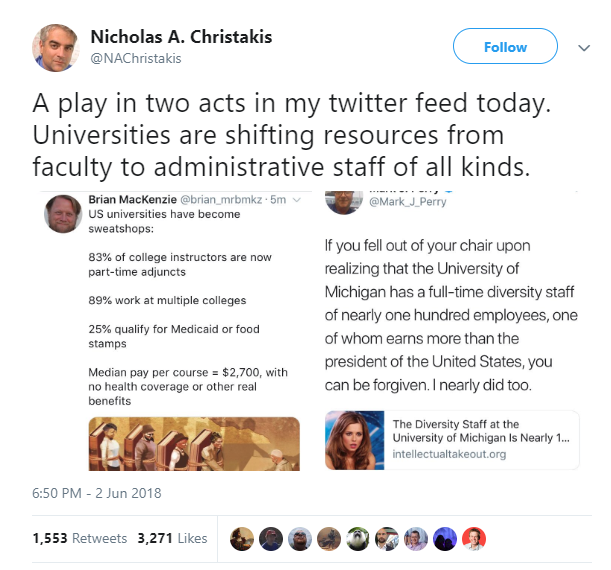Back in 2015 and again in April 2016, I commented on what I consider to be a fairly consistent litany of failures in American strategic leadership since, about 1960. Just this month I saw a new article (almost a synopsis of his recent book) in Foreign Affairs by George Packer about noted (notorious to some) American diplomat “Richard Holbrooke and the Decline of American Power.”
One paragraph caught my eye:
We prefer our wars quick and decisive, concluding with a surrender ceremony, and we like firepower more than we want to admit, while counterinsurgency requires supreme restraint. Its apostles in Vietnam used to say, “The best weapon for killing is a knife. If you can’t use a knife, then a gun. The worst weapon is airpower.” Counterinsurgency is, according to the experts, 80 percent political. We spend our time on American charts and plans and tasks, as if the solution to another country’s internal conflict is to get our own bureaucracy right. And maybe we don’t take the politics of other people seriously. It comes down to the power of our belief in ourselves. If we are good — and are we not good? — then we won’t need to force other people to do what we want. They will know us by our deeds, and they will want for themselves what we want for them.
There is, I fear, a lot of truth in that little paragraph and I am also worried that the American fascination (mainly the Pentagon’s fascination) with process and organization has spread to Canberra, London, Ottawa, Wellington and even Berlin. The notion is that if we can just get our organizations and procedures right then everything will fall into line. We have forgotten that while good, sound organizations and sensible, simple, robust procedure do matter, they need to be in service to a sound strategic aim (a vision, if you like) and, sometimes, ad hoc organizations and “off-the-wall” procedures work best in new situations, whether counter-insurgency or all-out war against a peer.
Ted Campbell, “Following the blind leader (3)”, Ted Campbell’s Point of View, 2019-05-21.
June 23, 2019
QotD: The American way of war
June 16, 2019
Encountering Richard Mitchell’s Less Than Words Can Say
In Quillette, Mark Andre Alexander recounts his first brush with “The Underground Grammarian”:
My first upper division English class shocked me when a dinosaur English professor, Dr. David Bell — a professor in Richard Mitchell’s mold, but not yet a curmudgeon — gave me my first C on a paper, busting my A-student self-image. That wake-up call helped me to see that, although I was published, I had much to learn about writing. Worse, in my first graduate course, Bell’s “Austen and Bronte,” I discovered that I had much to learn about reading, and that I lacked the acuity to appreciate Jane Austen’s clear, witty, and precise prose.
Not long before, I’d read Richard Mitchell’s first book, Less Than Words Can Say. I don’t recall how I stumbled upon him. I’d probably read some opinion column that referred to his work. In a publication announcement in the Underground Grammarian, Mitchell described it as “a melancholy meditation on the dismal consequences of the new illiteracy.”
He had wanted to title the book The Worm in the Brain, pointing to the dangers of administrative rhetoric. The publisher rejected that title as “too frightening and grisly,” But I knew I had found a fellow traveler when I read his Foreword:
Words never fail. We hear them, we read them; they enter into the mind and become part of us for as long as we shall live. Who speaks reason to his fellow men bestows it upon them. Who mouths inanity disorders thought for all who listen. There must be some minimum allowable dose of inanity beyond which the mind cannot remain reasonable. Irrationality, like buried chemical waste, sooner or later must seep into all the tissues of thought.
With that prophetic book, I first experienced the “cleansing fire [that] leaps from the writings of Richard Mitchell,” as George F. Will later described it.
Mitchell did title the first chapter “The Worm in the Brain,” in which he told the story of a colleague who would send him a note whenever there was some committee meeting. At first the note read something like, “Let’s meet next Monday at two o’clock, OK?” But when he aspired to become assistant dean pro tem, the simple, perfect prose changed. “This is to inform you that there will be a meeting next Monday at 2:00.” After achieving that appointment, the note read, “You are hereby informed that the committee on Memorial Plaques will meet on Monday at 2:00.” The worm in the brain had done its work.
I began to notice the worm in the brain during my everyday interactions with friends and colleagues at the university, especially the English professors. It often took the form of a label which created an image in the brain that prevented thought. One such professor, smart and engaging, returned a paper analyzing a passage in the U.S. Constitution. She gave the paper an A, but added, “I can’t help but feel that your argument is wrong, although I can’t explain why. I showed it to my husband, and he thought that it was a conservative argument.”
That statement invalidated the A, and I experienced my first taste of how subtly an abstract label can paralyze an otherwise thoughtful mind. Years later, while teaching at a business college, I saw a more pronounced form of the same phenomena. During a Business English class, I chatted with a bright student who volunteered for the NAACP. We would discuss all kinds of interesting topics, such as the similarities and differences between Martin Luther King and Malcolm X.
That is, until I noticed a change. She had stopped talking to me like a fellow human being and started talking at me like a white male. I stopped her and asked if she noticed what she had just done. She hadn’t, so I pointed out that she had shifted from talking to me to talking to an image inside her head. I told her that I would hold my hand up and block my face every time she did it. As the conversation proceeded, and I raised my hand, lowered it, and then raised it again, she became aware of the worm in her brain, a mental-emotional implant that prevented her from treating me as a colleague when certain topics were engaged.
Her implant was creating rubbish, of course, but it was insidious by nature because it disguised itself as something in the real world. Worms in the brain are like that.
June 4, 2019
What do you get for your tax money?
Alex Noble conducts a small experiment:

“Murderous Pothole”by samsaundersleeds is licensed under CC BY-SA 2.0
I suggest we stop thinking about taxes as paying for something useful – this type of thinking paralyses us and causes us to refuse to do that which needs doing. Because our taxes are supposed to pay for it.
We are no longer charitable, because our taxes pay for dole money.
We no longer look after the verge outside our homes, because our taxes are supposed to pay for a council worker with a strimmer.
We don’t repair potholes in our roads, because council workmen are supposed to fill them in.Just to check that last one, I contacted my local council.
“I was wondering if I could personally pay a local company to make repairs to the potholes that are causing damage to my car out of my money, and if so, would they be granted permission to close the road while my privately-funded repairs were being carried out?”
And they said…………
“It would not be possible for you undertake these repairs, and no permission would be given to close the road.”
So I proposed I make a payment to them, to be spent on repairing the road:
“…could I instead make a voluntary tax contribution on the condition the money is to be spent on these road repairs?”
And they said…
“…the County Council will not accept payment from members of the public for the provision of highway maintenance over and above that already collected via the Council Tax”
I made one last attempt…
“I have obtained quotes for the work which are acceptable to me and my neighbours – is there really no way we can as private individuals simply pay for the repairs to our road?”
They responded:
“…it is not possible to accept any from of funding other than that accepted via the Council Tax and Central Government.”
So I just went out and bought a bag of sand and pounded it into the hole one night. A temporary fix, admittedly.
£5 of sand and five minutes of my time.
No doubt the council are scouring CCTV as we speak in an attempt to bring to justice the criminal that repaired the road.
June 3, 2019
The state of US academia in juxtaposed tweets
American universities have problems, but the solutions they choose do not seem to be addressing those problems (screencapped, in case the tweet doesn’t load correctly):
June 1, 2019
Paying taxes is only for the little people like you and me…
Canada’s tax-gathering bureaucracy is eager to crack down on scams that attempt to hide taxable funds from scrutiny, although they seem to be rather more vigilant when it’s some poor slob who forgets to declare a grand or two from part-time work than multi-national organizations running decades-long scams to benefit deep-pocketed clients:
The Canada Revenue Agency has once again made a secret out-of-court settlement with wealthy KPMG clients caught using what the CRA itself had alleged was a “grossly negligent” offshore “sham” set up to avoid detection by tax authorities, CBC’s The Fifth Estate and Radio-Canada’s Enquête have learned.
This, despite the Liberal government’s vow to crack down on high-net-worth taxpayers who used the now-infamous Isle of Man scheme. The scheme orchestrated by accounting giant KPMG enabled clients to dodge tens of millions of dollars in taxes in Canada by making it look as if multimillionaires had given away their fortunes to anonymous overseas shell companies and get their investment income back as tax-free gifts.
KPMG is a global network of accounting and auditing firms headquartered out of the Netherlands and is one of the top firms in Canada.
“Tax cheats can no longer hide,” National Revenue Minister Diane Lebouthillier promised in 2017.
Now, Tax Court documents obtained by CBC News/Radio-Canada show two members of the Cooper family in Victoria, as well as the estate of the late patriarch Peter Cooper, reached an out-of-court settlement on May 24 over their involvement in the scheme.
Details of the settlement and even minutes of the meetings discussing it are under wraps. A CBC News/Radio-Canada reporter who showed up to one such meeting this spring left after realizing it was closed to the public.
Journalists discovered references to the final settlement agreement in Tax Court documents only by chance.
May 24, 2019
Ottawa chooses boring names for their new light rail trains
OC Transpo, the Ottawa area transit authority, ran a contest for children to suggest names for their new light rail trains. Being bureaucrats, they carefully avoided choosing some rather clever names the kids suggested:

Ottawa O-Train leaving St.Laurent Station tunnel, January 2018
Photo by “Saboteurest” via Wikimedia Commons.
When commuters and tourists finally do step on to the $2.1 billion light-rail system – already more than two years behind schedule – they’ll ride Maple Taffy, Snowbird or Northern Lights, when they could’ve boarded Shania Train or Roberta Bondcar, a witty nod to Canada’s first female astronaut.
Culled from entries restricted to children 16 and under, winning selections that consisted largely of Canadian clichés favoured by the City of Ottawa, was not due to a lack of overall creativity from the youth who participated.
Zooming Poutine, The Queensway Cruise and Sir Chuggsalot were overlooked for winning selections Poppy, Totem and Tundra. Galloping Goose, Tunnel Beaver and The Speed Beaver were also overlooked by judges, who preferred The Canada Goose, Majestic Moose and Nanuq/Polar Bear.
Even Ottawa professional sports teams and fan-favourites like former Senators’ stars Daniel Alfreddson and Erik Karlsson – The Alfie and Karlsson Express – didn’t make the cut, while Rocket Richard, the Montreal Canadiens legend, will rub this in at every stop his train makes.
[…]
But perhaps the most glaringly overlooked multiple-entry from the more historically-minded youth was Thomas Ahearn, a local inventor and founder of the Ottawa Electric Railway Company which built the city’s original streetcar system.
Judges also denied Justin Traindeau and The Jimmy Wagon (a wink at current Ottawa Mayor Jim Watson), and weren’t keen on Sorry, NIMBY Express, Taxed To Death and Da Sink Hole from the more politically sardonic kids; the latter a jab at the huge pit rail construction opened up on Rideau Street.
May 16, 2019
When is an archaeological artifact merely “recyclable”?
In Sweden, they’ve got such a rich history of archaeological artifacts that they’re no longer preserving, categorizing, cleaning, displaying, or storing new artifacts that come to light … they’re dumping them in the recycling bin. Literally:

An amulet ring from the Iron Age, an example of the sort of newly found artifact that Swedish archaeologists are recycling. (Photo from Svenska Dagbladet, caption from Never Yet Melted)
In what looks like a new paroxysm of self-hatred and cultural suicide, Sweden has begun destroying artefacts from its ancient Viking history.
One might think that the country, over-run by hordes of Middle Eastern “asylum seekers”, would wish to preserve as much of its national identity and cultural heritage as it could. Even at the most mercenary level, Viking sites, museums, artefacts and souvenirs have been huge tourism money-earners. The television series Vikings shows Western man’s fascination with the hairy old sea-rovers. The immensely popular books and films of The Lord of the Rings drew in large part upon Norse mythology as well as Christianity, showing its deep resonances even for modern man.
Now an angry archaeologist has blown the whistle on the fact that the curators of Stockholm’s Länsmuseum have been ordering the systematic destruction of newly-found artefacts from the Iron Age and the Viking period with the weak excuse that the material would be too burdensome to process. This is despite the fact that preservation of the past is what being a museum curator is meant to be all about.
Coins, arrow-heads, ritual amulets, weapons, jewellery and weights that were kept in the past are now dumped into metal-recycling bins upon discovery instead of being cared for and displayed. Museum excavators are instructed to recycle unearthed iron elements into scrap metal on the weak pretext that “it would take too many resources to process, identify and store them”. The findings are usually quickly disposed of in order to make way for construction machines and building workers.
Ironically yet appropriately, the boom in excavation which has led to the doomed artefacts being unearthed has largely been to provide housing for the asylum seekers flooding into the country, and who are now pushing the crime-rate back towards, well, towards Viking levels.
This process was kept secret until a declaration by Johan Runer, the museum’s archaeologist. He had tried to raise the alarm before but only met indifference from the liberal Swedish media. According to Runer, this has been going on since at least 2016. He claims an entire ancient settlement was secretly levelled to allow roadworks.
If this story seems familiar, it’s because it’s not a new phenomenon … I blogged a similar story back in 2017.
May 1, 2019
To the surprise of nobody, Ontario’s cannabis stores are still struggling
The Ontario government created a tightly restricted retail market regime for newly legal cannabis sellers, with a tiny number of licenses issued and highly bureaucratic “safeguards” for the retailers’ guidance and control. The city of Toronto, for example, with a population in the 2.7 million range, was allocated a whopping five stores. Only one of those stores was allowed to open on the first day of legal retail sales, and today there are three in operation, despite penalties and potential loss of licenses at stake for those who haven’t opened yet. The chorus of complaints from would-be customers has not diminished much, if at all since day one:
With legalization day long come and gone (and the euphoria of being able to spark a joint in public gone with it), the turtle-paced roll-out of Toronto’s weed retail scene goes to show the government and the OCS have some work to do before purchasing legal weed can be completely glitch-free (and lineup free, too).
Here are a few of the lows of getting high, courtesy of Toronto weed stores since buying pot became legal.
Weed prices are up
According to Statistics Canada, prices for weed have steadily been on the up and up since legalization last year.While Nova Cannabis is trying to tackle its biggest competitor (illicit weed stores) with Black Market Buster deals, people who are buying their cannabis from the OCS are now paying an average of about $9.99 per gram—that’s roughly $3 more than those buying their bud from illegal stores.
Black market weed is still thriving
There’s still around 20 illegal dispensaries operating in the city, and at least 100 illegal marijuana delivery services. Why? See above: unlicensed weed stores are significantly cheaper than the legal ones, and loopholes in the city’s laws allow them to operate pretty much undisturbed, save for the occasional raids.[…]
OCS packaging
Aside from the fact every product coming out of the OCS comes triple-wrapped in excessive, sometimes non-recyclable polypropylene packaging, the containers are just plain confusing.Lack of packaging standards means your order comes in all shapes and sizes, regardless of whether you’re getting bud or pre-rolled joints, which is as confusing for buyers as it is for those behind the counter.
And that doesn’t even include the even louder chorus of complaints about the quality of the legal product…
April 18, 2019
QotD: Roadblocks to deregulating the US healthcare market
One problem America has is simply that our government administration isn’t very good. That’s not true across the board — our government statistics are, IMHO, the finest in the world. But there’s stuff that other countries can do that we can’t, either because our government is more decentralized, or because our civil service just isn’t as prestigious (and therefore as full of competent, motivated people) as those in other countries. And our regulatory approach — rules rather than principles based, and highly adversarial — is also suboptimal, and hard to change.
Given how much the government now interferes in health care, that’s a big problem. Given our lack of administrative competency, our first step should be pulling back where we can — trying to push more ordinary expenses onto consumers, for example, who can manage those the same way they manage their aspirin and antacid purchases now. And eliminating the tax deduction for employer sponsored health care would be major. But I fear, politically impossible.
Megan McArdle, “Ask Me Anything”, Reddit, 2017-04-10.
April 13, 2019
QotD: School vouchers
I am still a supporter of school vouchers. I don’t think they’ve lived up to the hopes that I (and a bunch of other folks) had for them. But that said, the best opponents can say is that they don’t do all that much better than the public schools on academic measures. Parents like them, kids like them, and they cost less. I just don’t see a good argument against them.
I think it’s telling that of the folks I know who oppose vouchers, not one of them has voluntarily kept their kids in a failing urban school. When they move, they choose a house in a good school district. I don’t see how you can morally do that and then tell some other, poorer parent that they need to lean into the strike zone and take one for the team.
That said, maybe there’s an argument for restricting them to kids in failing schools, or below a certain income. I don’t see any need for the government to subsidize Exeter. But for the kids who are trapped, I think they should get the same chance middle class kids do, even if it’s not the panacea we once hoped.
Megan McArdle, “Ask Me Anything”, Reddit, 2017-04-10.
April 8, 2019
QotD: Why does US healthcare cost so much?
This is a hotly debated question in health care policy. Here’s my rough stab at it: the 1970s inflation interacted particularly badly with two pre-existing policy choices: the tax deduction for employer-sponsored health insurance, and Medicare.
Start with employer-sponsored health insurance, which is, as everyone knows, tax advantaged relative to salary, because your employer can deduct it as an expense, but you don’t have to show it as income on your taxes.
This was an incredibly dumb decision, but in the defense of the folks who made it in the 1940s, at the time, health insurance wasn’t very expensive, because the health care system couldn’t do all that much (and the female labor that ran hospitals was cheap due to discrimination, or in the case of nuns, basically free).
Come the 1970s, inflation started causing a problem called “bracket creep”. Back then tax brackets weren’t indexed for inflation, so as inflation went up, folks got pushed into higher and higher tax brackets, even though the buying power of their salary had stayed the same, or [had] gone down. This was great for the government (and is a big reason our deficits were not disastrous in the 1970s), but it was terrible for people, and led to the tax revolts that helped put Reagan in office.
But I digress. The point is that bracket creep made non-taxed benefits much more attractive relative to salary, so insurance started getting more generous. That process has continued for decades. Insurance used to be “major medical” that covered big ticket items like hospital stays. Now we expect it to cover the cost of going to the doctor for the sniffles. Well, if you insulate people from those costs, they will incur more of them.
Effectively, this raises demand for health care services. But the US system, decentralized and litigation-happy, is very bad at controlling the supply side. End result: high costs.
The other thing that happened is Medicare. The original legislation called for reimbursing services at “reasonable and customary rates”. This was a gold mine for doctors and hospitals. In New York, for example, doctors used to be forced to do charity care as the price of their admitting privileges at prestigious city hospitals. Once Medicare came into the picture, there was no need for that! Or to economize on beds; you could always find someone to fill them. Eventually, Medicare tried to crack down (http://reason.com/archives/2011/12/13/medicare-whac-a-mole), but by then, it was damned hard to cut physician and hospital incomes, in part because they had made decisions based on their — like building new hospitals with all private rooms — that couldn’t be undone. Our cost base is permanently higher, and politically, we have shown no will to slash provider incomes. So even though our growth rate is about average for the OECD, we’re growing from a much higher level.
Megan McArdle, “Ask Me Anything”, Reddit, 2017-04-10.
April 4, 2019
March 30, 2019
QotD: Organic spices are a racket
There’s a whole other piece to be written about organic spices, but the short version is that demanding organic spices is never going to be good for the farmers growing them. The U.S. standards for organic products amounts to ridiculously expensive and oftentimes unnecessary practices for small farmers who just don’t have the resources to do it. There are plenty of ways to arrive at ethical treatment of animals and land that are not part of our complicated organic laws. And that’s not to mention the people who demand organic products but will also freak out at the sight of a bug or won’t buy something that’s even a little bit misshapen or with a tiny brown spot on it. You can have pesticides or you can have pests.
Caitlin PenzeyMoog, “Salt grinders are bullshit, and other lessons from growing up in the spice trade”, The A.V. Club, 2017-04-06.
March 8, 2019
Education schools and the bloat of university administration
Remember the old joke:
Those who can, do.
Those who can’t, teach.
Those who can’t teach, teach gym educational studies.
As far as higher education is concerned, the joke is on us:
Though I didn’t realize it at the time, those were my first encounters with an alternate curriculum that was being promoted on many campuses, a curriculum whose guiding principles seemed to be: 1) anything that could be construed as bigotry and hatred should be construed as bigotry and hatred; and 2) any such instance of bigotry and hatred should be considered part of an epidemic. These principles were being advanced primarily, though not exclusively, by college administrators, whose ranks had grown so remarkably since the early 1990s.
Everyone knows about the kudzu-like growth of the administrative bureaucracy in higher education over the past three decades. What most don’t know is that at many colleges, the majority of administrators directly involved in the lives of students — in dorms, conduct hearings, bias-response teams, freshmen “orientation” programs, and the like — got their graduate degrees from education schools.
Ed schools, such as Teachers College at Columbia, or Penn’s Graduate School of Education, have trained and certified most of the nation’s public-school teachers and administrators for the past half-century. But in the past 20 years especially, ed schools have been offering advanced degrees in things like “educational leadership,” “higher education management,” and just “higher education” to aspiring college administrators. And this influx of ed school trained bureaucrats has played a decisive role in pushing an already left-leaning academy so far in the direction of ideological fundamentalism that even liberal progressives are sounding the alarm.
To anyone acquainted with the history and quality of American ed schools, this should come as no surprise. Education schools have long been notorious for two mutually reinforcing characteristics: ideological orthodoxy and low academic standards. As early as 1969, Theodore Sizer and Walter Powell hoped that “ruthless honesty” would do some good when they complained that at far too many ed schools, the prevailing climate was “hardly conducive to open inquiry.” “Study, reflection, debate, careful reading, even, yes, serious thinking, is often conspicuous by its absence,” they continued. “Un-intellectualism — not anti-intellectualism, as this assumes malice — is all too prevalent.” Sizer and Powell ought to have known: At the time they were dean and associate dean, respectively, of the Harvard Graduate School of Education.
More than three decades later, a comprehensive, four-year study of ed schools headed by a former president of Teachers College, Arthur Levine, found that the majority of educational-administration programs “range from inadequate to appalling, even at some of the country’s leading universities.” Though there were notable exceptions, programs for teaching were described as being, in the main, weak and mediocre. Education researchers seemed unable to achieve even “minimum agreement” about “acceptable research practice,” with the result that there are “no base standards and no quality floor.” Even among ed school faculty members and deans, the study found a broad and despairing recognition that ed school training was frequently “subjective, obscure, faddish, … inbred, and politically correct.”
February 7, 2019
Cultural nationalism versus cultural imperialism at the CBC
Andrew Coyne reflects on the odd musings of CBC president Catherine Tait:
“There was a time,” Catherine Tait was saying, “when cultural imperialism was absolutely accepted.”
The CBC president was musing, at an industry conference in Ottawa last week, about the heyday of the British and French Empires, when if “you were the viceroy of India you would feel that you were doing only good for the people of India.” Or, “if you were in French Africa, you would think ‘I’m educating them, I’m bringing their resources to the world, and I’m helping them.’ ”
The comments have since come back to bite her, not because many people have a kind word for imperialism these days but because she was comparing those colonial empires, which invaded and conquered territory by force of arms, to the “new empire” of Netflix. As more than one commentator has objected, none of the six million Canadians who subscribe to Netflix was made to do so at the point of a gun.
Neither is it evident what comparable “damage” is done by a service that gives willing viewers in this country access to well-made television programs from around the world. It was, in short, an altogether silly line of argument.
And yet it seems wrong to heap such particular scorn on Tait. For in truth she was only giving voice to the sort of thinking typical of her generation and class: middle-aged cultural bureaucrat/subsidized private producer, of a kind found in particular abundance in the Montreal-Toronto corridor. The same defensive attitudes, what is more, have for decades formed the foundation of much government policy on culture, even if they are largely incomprehensible to a generation raised on Netflix and YouTube.
There was a time, that is, when cultural nationalism was absolutely accepted — when it was taken as a given among the educated classes that it was the responsibility of government to protect and defend Canadian culture, if necessary from Canadians themselves. Hence the whole apparatus of CanCon, most of which is still with us today.







